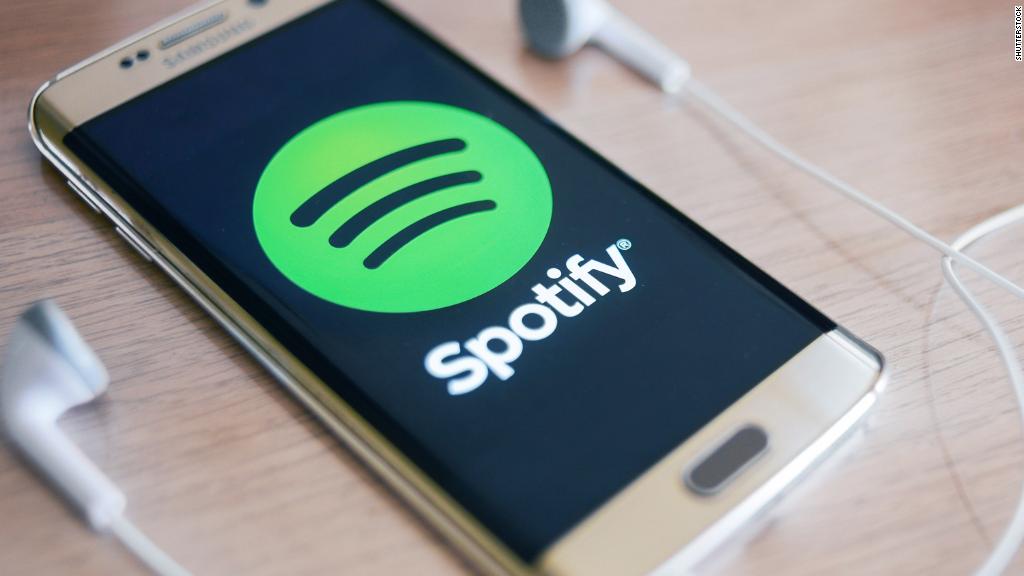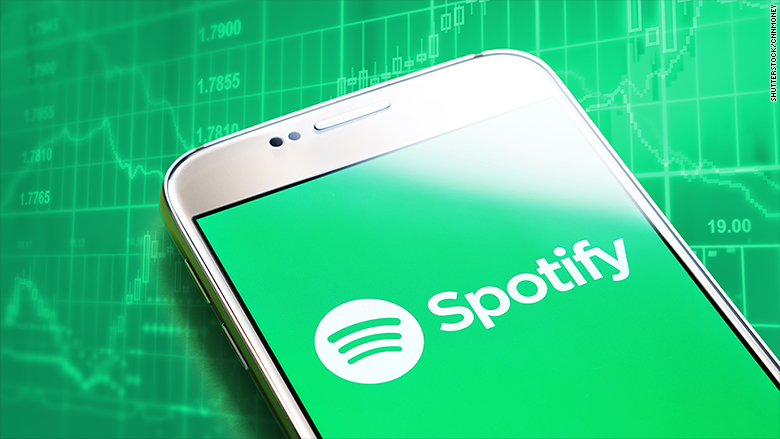
Apple tried to kill Spotify. Now the streaming music service is worth nearly $30 billion.
Spotify (SPOT) opened at $165.90 a share on the New York Stock Exchange Tuesday. The stock later fell below $150 a share.
Its Wall Street debut has been closely followed in recent weeks as much for the unconventional approach to a public offering it chose as for the company itself.
Unlike traditional IPOs, Spotify did not raise new capital. Instead it simply listed existing shares directly on the stock exchange without relying on underwriters to attract investors, set a price and stabilize the stock as it begins trading.
Spotify selected market maker Citadel Securities for a role in setting an opening price based on buy and sell orders. The price discovery process was unusually long.
The unusual IPO process had analysts effectively throwing up their hands about what to expect after Spotify went public. They don't even know what to call the event.
"Officially we are not even calling it an IPO," says Matt Kennedy, an analyst at Renaissance Capital, which manages IPO-focused exchange-traded funds.
Analysts have pinned the price target for the stock at anywhere from $160 to $220 per share in the next 12 months. Spotify had traded as high as $132.50 on the private market, according to a regulatory filing.
Spotify chose the direct listing method in part to ensure that employees and longtime shareholders could sell stock on day one if they choose. If it were a typical IPO, they'd have to wait for a share lockup period to end to sell their stock.
But that could be bad news for those who invest once the company goes public. A huge number of shares hitting the market all at once could sink the stock price.
Related: Inside the war between Spotify and Apple
If Spotify can avoid too many wild swings in the coming days, its alternative public listing process could entice other big name companies who don't need to drum up as much investor demand as companies do in a traditional IPO.
"This won't be replicated often," Kennedy says. "However, it's possible that the largest and best-known names -- Uber, Airbnb -- may choose this route if Spotify's listing is successful."
Silicon Valley is certainly watching. Bill Gurley, an Uber investor, tweeted on Tuesday that the "establishment wants direct listing to fail so they throw shade."
On the eve of the public offering, Spotify CEO Daniel Ek touted the decision to avoid the usual fundraising and fanfare of an IPO as an example of the company thinking different.
"Normally, companies ring bells. Normally, companies spend their day doing interviews on the trading floor touting why their stock is a good investment. Normally, companies don't pursue a direct listing," Ek wrote in a public post. "While I appreciate that this path makes sense for most, Spotify has never been a normal kind of company."

Even without all the bells and whistles, Spotify has used its public offering to take a victory lap of sorts. In its filing to go public, Spotify noted that it had roughly twice the number of paying subscribers as its next closest rival, Apple (AAPL).
In the decade since Spotify launched, it has faced a series of so-called "Spotify killers" from the likes of Apple, Google (GOOGL) and Amazon (AMZN). So far, none of have lived up to that title -- though the competition remains fierce.
Shortly before Spotify began trading on Tuesday, Amazon teased that it now has tens of millions of active subscribers for its music service, though it did not reveal an actual number.
Related: Spotify's secret weapon
By comparison, Spotify expects its audience could top 200 million monthly users by the end of this year, with as many as 96 million of them paying for the service, according to a regulatory filing.
"A couple thousand people totally dedicated to the task of maximizing the value of music and delivering the most compelling product to its users is going to beat a company for whom it's not part of the core business," Ken Parks, the chief content officer at Spotify from its founding until 2015, previously told CNN.
That success hasn't come cheap. Spotify lost about $1.5 billion in 2017, more than double its loss from the prior year.
Bleeding money may not be enough to turn off investors, however. Spotify is going public at a time when there is pent-up demand for new tech IPOs.
"Even with all the buzz that it's going to be a great tech IPO year, they're still few and far between," says James Gellert, CEO of RapidRatings, which rates the financial health of public and private companies.
Case in point: Dropbox, another mature but unprofitable billion-dollar tech company facing a similarly daunting list of rivals, is up more than 40% from its IPO last month.

